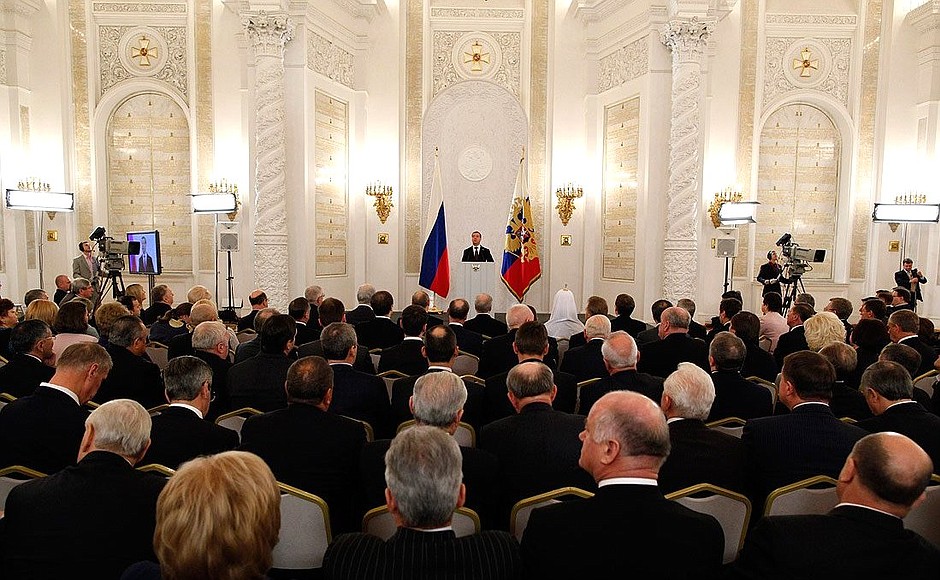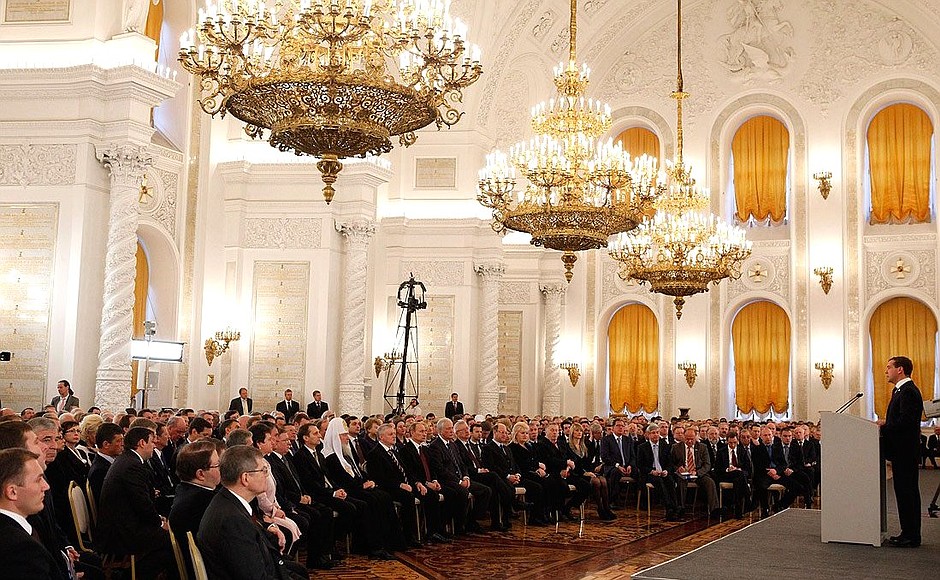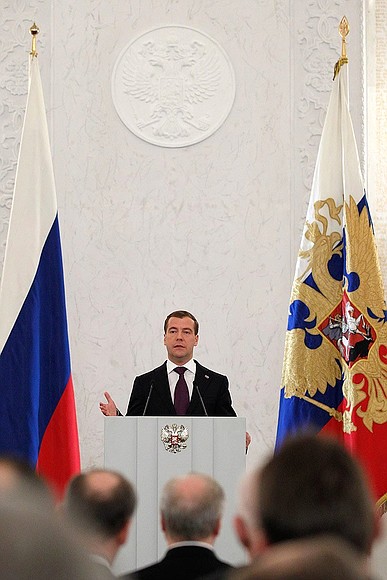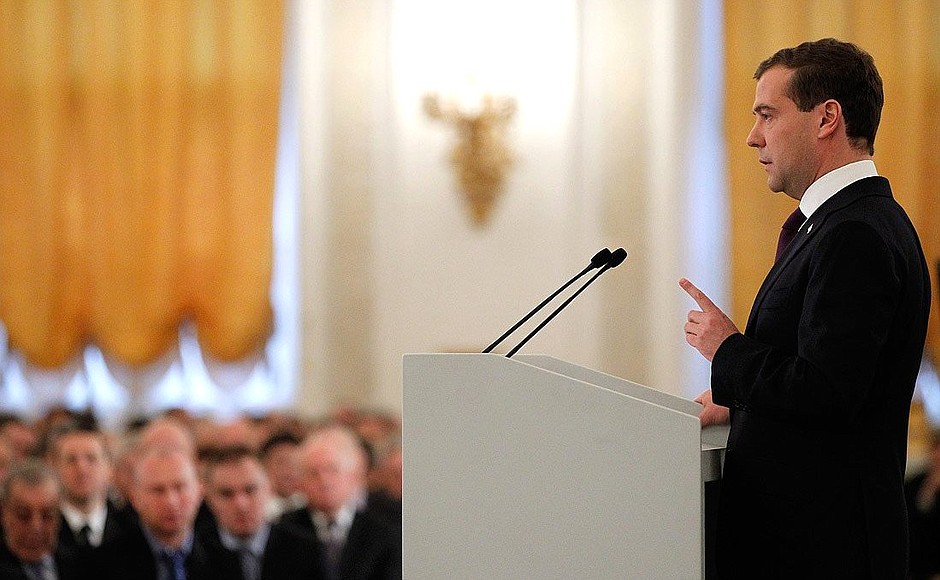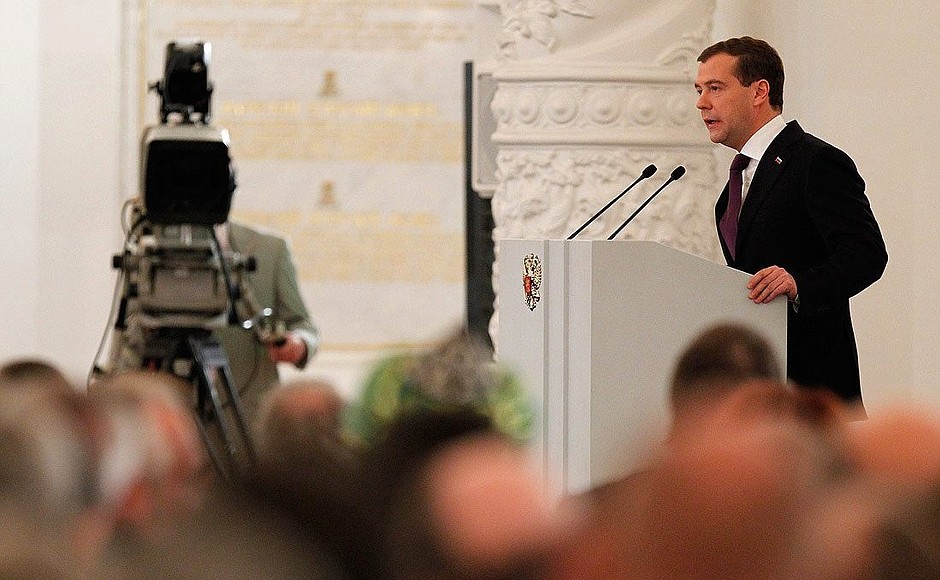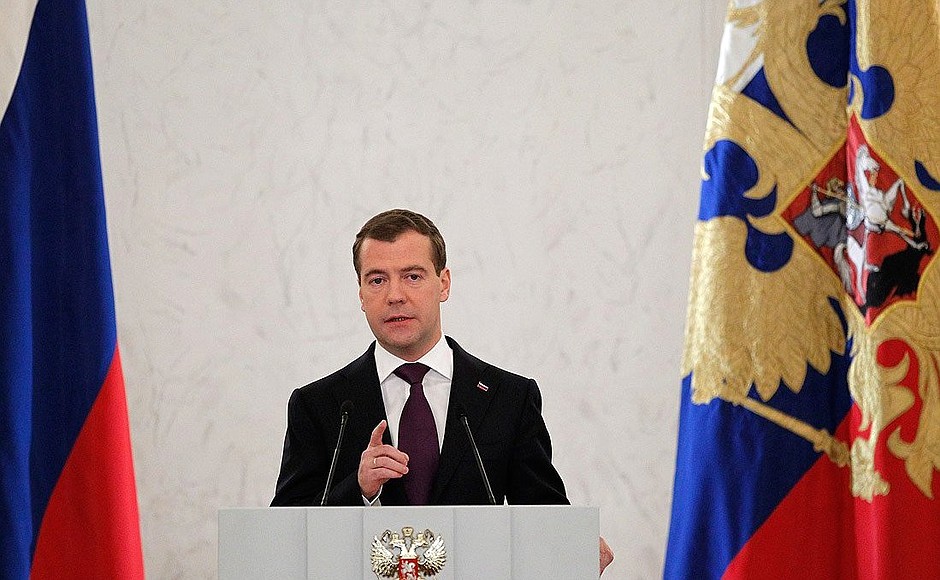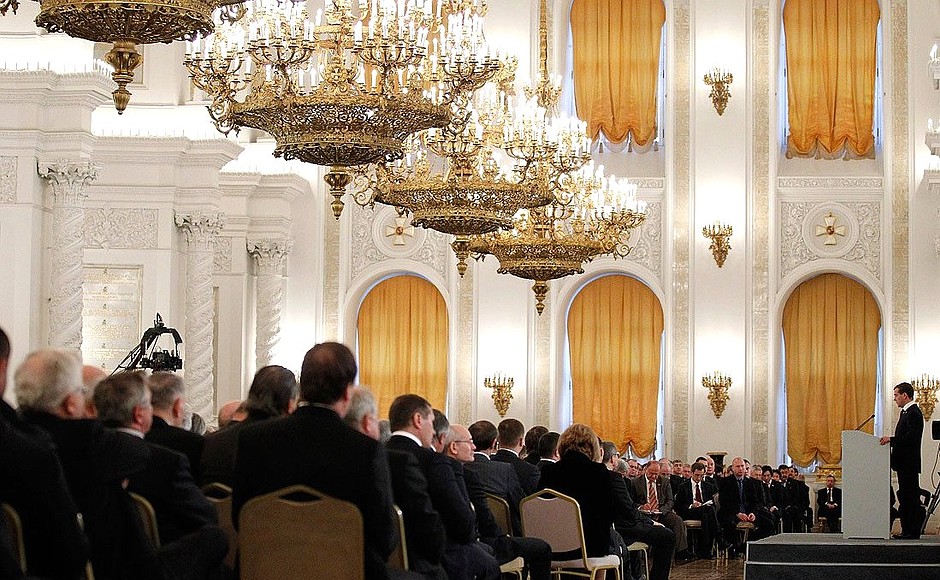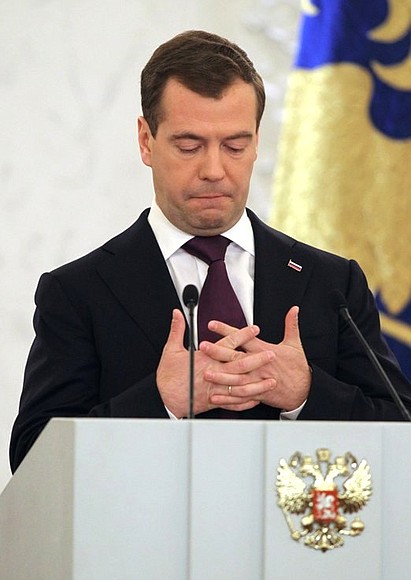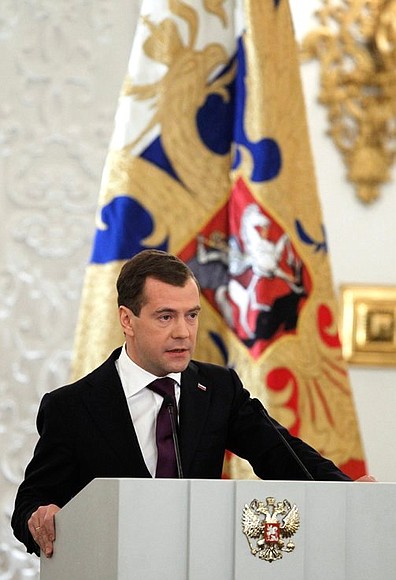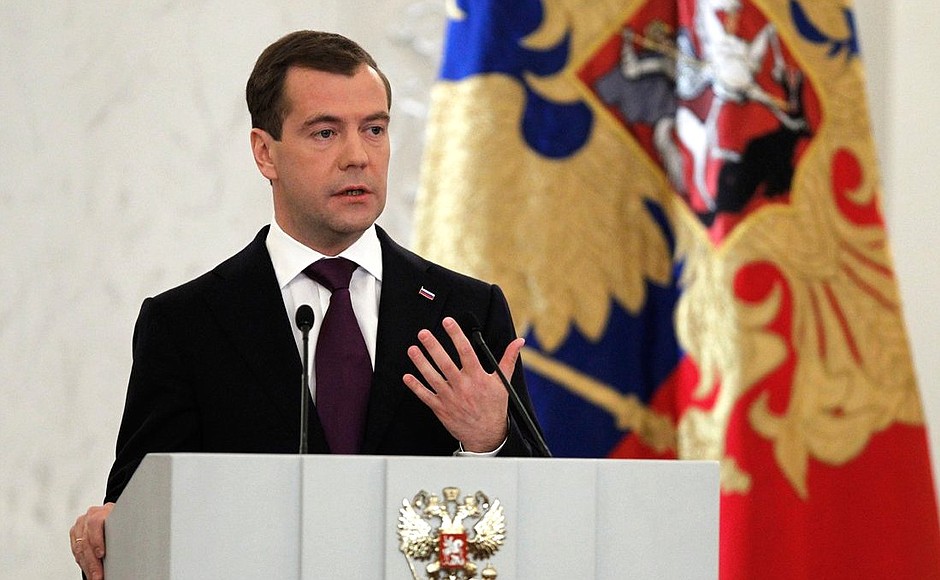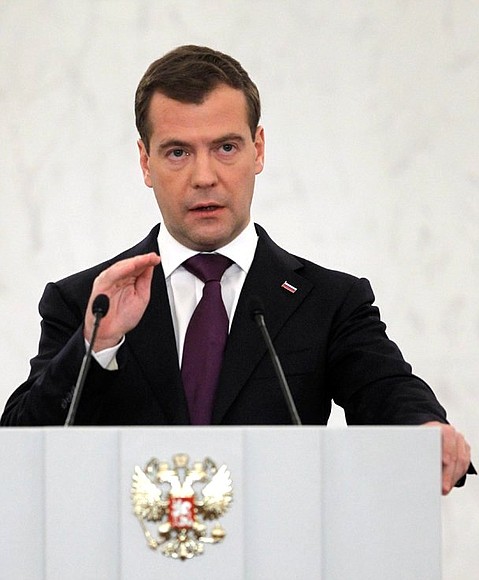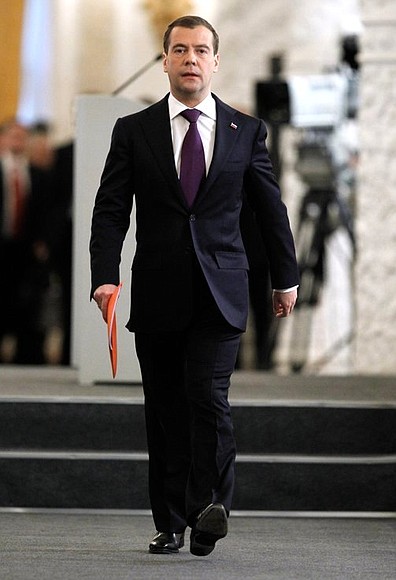President of Russia Dmitry Medvedev: Citizens of Russia,
State Duma deputies and members of the Federation Council,
Speaking in this room a year ago, I presented my political strategy, which was to modernise our economy and give impetus to progress in all areas, based on democratic values; to raise a generation of free, well-educated and creative people; to raise the living standards of our people to a fundamentally new level; to confirm Russia's status as a modern world power whose success is based on innovation.
These processes, modernisation in our country, began at a time, which was hard for the whole world, a time of the global crisis. Compounding this were the heat wave and wildfires of last summer. Yet, despite the difficulties, on the whole we were able to accomplish quite a few things, and I would like to thank all those who contributed to renewing our society.
We managed to stabilise our economy after a significant downturn, and this year we expect economic growth of 4%. Despite the growth of food prices, which regrettably occurred throughout the world, we prevented an inflation upsurge. Our objective for the next three years is to bring it down to 4–5% a year.
Almost 150 billion rubles were allocated to the agricultural sector in order to mitigate the consequences of the drought. Our decisions will stabilise the situation in this key industry, help the farmers and prevent a drop in living standards in the affected areas. I will continue to personally monitor the implementation of these decisions.
The number of the unemployed is now about 5 million people, a reduction of 2 million since the crisis peaked. This is a significant achievement. Sovereign debt is at a very low level. Russia's international reserves today amount to about $500 billion, much more than at the end of 2008.
”Taking care of future generations is the most reliable, smart and noble sort of investment we can make.“
After the anti-crisis measures, which were unprecedented in scale, we are now moving on to a more balanced budget policy. The budget deficit, unfortunately, remains quite high. We will reduce it lest it becomes an obstacle to development. All the leading nations have taken up similar obligations.
Of course, the economic situation is still quite complex. We haven’t overcome all the consequences of the crisis yet, and we must admit this openly. But we will fulfil our social obligations regardless of anything.
The real income of our people has grown by approximately 5% over the last few months. Next year, we are planning to raise the salaries of public employees. We are implementing targeted programs to provide housing for war veterans and army personnel.
We have been able to raise pensions every year. I had set an objective to provide all pensioners with an income of at least the subsistence minimum, and this goal has been achieved. Yet, the average level of pensions remains quite low, of course.
To raise pensions and modernise the healthcare system, we made a number of tough decisions, including raising mandatory medical insurance premiums. People talk a lot about this today. We need to find a way to mitigate the negative impact of this measure on businesses. In this context, I made the following decision. Small businesses working in manufacturing or providing social services will be given a two-year transition period with a lower premium level set at 26%.
This year, we focused on the priority areas of technological modernisation. Our goal is to raise our economy’s energy efficiency by 40% by 2020. This goal is realistic, and I am absolutely sure we can achieve it. This will both reduce corporate expenses and help people save their money, primarily and perhaps most importantly, when they pay utility bills. We discussed the issue recently, and the main conclusion we came to was that, in order to prevent further degradation of the utility infrastructure and at the same time enhance energy efficiency, we need to attract private investors to the housing and public utilities sector more actively. I have already given all the necessary instructions on this issue.
Also, I’d like to note that we have certain achievements in the development of high technology. For example, Russia’s nuclear industry is once again building and launching new power plants every year. Nine reactors are currently under construction in Russia. In addition, Russia is working on projects in India, Iran, China and other countries. The total volume of atomic industry’s orders for machine-building products has grown tenfold over the past three years, or by 25 times against 2005. It is a good figure. Of course, the state budget and all the people employed in the industry benefit from that.
To give you another example, today the world’s top 500 supercomputers feature 11 systems made in Russia. Next year the performance of Russia’s Lomonosov supercomputer will grow by more than 2.5 times, making it one of the most powerful computers in the world. The GLONASS satellite grouping will be complete before the end of this year, and within the next two years all key digital navigation maps will be ready, so our own satellite navigators will be available for use. The capacities of GLONASS will serve the mass consumer. By next year, most border regions will have digital access to the package that includes all must-carry public TV channels. We will build over 1000 facilities for the public digital broadcasting system. This year, we taught the Internet to speak Russian, so to say. It is important, even in terms of Russia’s reputation. The .рф domain is open and gaining popularity. I consider that to be another one of our achievements.
In addition, we have started to implement the new strategy for the development of Russia’s pharmaceutical industry. Over the next few years the share of Russian pharmaceuticals on the domestic market has to be radically increased. We want to see an increase from 20% to 50% and up to 60% for innovative products. This will make medicines more accessible. I hope growth in pharmaceutical exports will become an important item of income for Russia.
”The modernisation is not a goal in itself. It is an instrument, a tool that would allow us to solve economic and social problems that are long overdue. An instrument we can use to support those who need it most and create the conditions that would help develop the potential of those we pin our hopes on: our youth and our children.“
The Skolkovo centre remains our most renowned innovation project. I put forward this idea less than a year ago. Today the project is becoming reality. We have the land, the management team and we have laws setting up unique preferences for those who will be involved in the project. Finally, we have concrete suggestions from private and state-owned companies that are ready to start work on it at any time.
I’d like to emphasise that tax exemptions and state funding for research should be made available to anyone who has ideas and meets our eligibility criteria.
In addition, we are planning to allocate approximately 30 billion rubles for joint research projects between universities and businesses. That is a significant sum of money but if the projects are successful I believe the financing should be increased.
There is another project that we consider important. Our project to turn Moscow into a major international financial centre. The responsibility for that project lies on the federal authority, the city administration and the new mayor of Moscow. Major financial institutions from Russia and abroad are involved in the work. I am sure we have a chance to succeed in that project. The benefits of having an efficient financial market will be evident for the people, for the business, which will be able to take advantage of the whole range of modern financial services, and of course for the whole country which will benefit from an influx of investments and taxable new enterprises.
We have, achieved a lot in one year but I hope we all realise that this is only the very beginning. The resources we possess should be used to modernise our economy rather than to mend holes. We have to create new, competitive goods and services and millions of jobs. We have to create a demand for innovation, develop our small and medium-sized business and expand the professional and social prospects of our people.
I’m instructing the Government to direct at least 50 percent of the saved budget funds and part of our extra income towards modernisation projects. That includes the much-talked-about rise in the energy efficiency of our economy, the development of new technologies in the energy, IT, telecom and medicine sectors. The quality of our people’s life depends on our success in these fields.
Colleagues,
Everything I was talking about just now, all the modernisation is not a goal in itself. It is an instrument, a tool that would allow us to solve economic and social problems that are long overdue. An instrument we can use to support those who need it most and create the conditions that would help develop the potential of those we pin our hopes on: our youth and our children. Modernisation is carried out for their sake. We must not be ashamed for the country we pass on to our children and grandchildren but who we pass Russia on to is also crucial. The 26 million children and teenagers living in Russia have to fulfil their potential, grow up to be happy and healthy and become worthy citizens of Russia. This is our No. 1 priority.
Taking care of future generations is the most reliable, smart and noble sort of investment we can make. A society that effectively protects the rights of its children and respects their dignity is not only kinder and more humane. It develops faster and better. It has a good and predictable future.
I believe it is vitally important for us to introduce an efficient state policy for children. A modern policy that would correspond with our national development interests. This is why today’s address will focus on that subject as I speak about the issues that I believe need to be addressed and resolved in a new way.
First, the measures to improve the demographic situation. Compared to 2005, our birth rate has increased by over 21%. This is one of the best growth rates in the world. Infant mortality dropped by 25%. Last year, for the first time in the past 15 years our country saw an increase in population. To a large extent, this is the result of the maternity capital programme, the national Healthcare project and other family-oriented social support measures.
We started tackling the demographic problem seriously and have launched a long-term program. But we should understand that the next 15 years will see the effects of the demographic downturn we suffered in the early 1990s, with the number of women of reproductive age decreasing considerably, which poses a serious threat and challenge to the whole of our nation.
What should we do about it?
First, we must enhance both the quality and availability of medical assistance and social benefits to mothers and their children. We must further develop the maternity certificate programme, as well as rehabilitation programmes for children under 3 and low-birth-weight infants. We must also increase state support of fertility programmes, including in vitro fertilisation.
Second, we must undertake technological modernisation of children’s hospitals and clinics and to upgrade the skills of medical staff working there. Considerable funds must be allocated for these purposes through co-financing of regional programmes starting already from the next year. At least 25% of the funds earmarked for healthcare modernisation schemes will go to developing children’s healthcare. This is a lot of money; essentially, it can amount to some 100 billion rubles in the next two years.
”We started tackling the demographic problem seriously and have launched a long-term program. But we should understand that the next 15 years will see the effects of the demographic downturn we suffered in the early 1990s.“
Today, almost a third of all children have health problems by the time they reach school age. Teenage statistics are even sadder: two thirds have health deviations. Starting from 2011, we must monitor more closely their health through extended medical examinations.
Special attention should be given to vaccination, to making quality medicines available to children and teenagers, to early detection of tuberculosis, oncological and other dangerous diseases. Funds should be allocated for these purposes, as well.
The third point, which is of the utmost importance, is supporting young and large families. One of the most acute problems is that of housing. Since 2008, law allows using the maternity capital to pay out mortgages and housing loans under contracts closed before December 31, 2010, which means that this money can be used even before the child turns three. Almost 250,000 Russians have already used this opportunity, while the housing market got extra incentives for development, which is important in the post-crisis period. I believe that starting from the next year this should become regular practice.
The forth point is that according to the experts, the main way to overcome the demographic crisis is a radical increase in the number of families with three and more children. Quite recently, while searching the web I’ve come across a piece of interesting information about a social advertising campaign, which took place in the Altai Territory, if I am not mistaken. The idea is simple, but very nice. People were asked to tell which Russian celebrities and distinguished Russians were third children in their families. Among them were Nikolai Nekrasov, Anton Chekhov, Yuri Gagarin, Anna Akhmatova. Without these great people, without their creative work and achievements, the world would have been different. Humanity would have been poorer in terms of morality and culture.
Therefore, I believe that most favourable conditions must be created for large families. In some regions, for instance, in the Ivanovo region, as far as I am concerned, a family gets a free land lot to build a house or a dacha when a third child is born. It’s the right kind of decision and a good example for other regions.
I believe that this should become common practice across Russia. I instruct the Government and regional authorities to design a programme of free land allocation for house/dacha construction, when a third and every subsequent child is born. This standard may be introduced gradually, with due regard to regional specifics.
Regions may go for other measures to support large families. For example, in the Ulyanovsk region young families receive a 100,000-ruble certificate with the birth of a third child and subsequent children. I suggest that all regional heads should think of introducing regional maternity capital. This step will definitely require money. Its implementation depends on the situation in a specific region, but the result is worth it.
The fifth point. We must introduce additional tax benefits for families with three or more minors. Specifically, tax refund must be increased up to 3,000 rubles per month per child starting with the third child. I am instructing the Government to submit relevant proposals and draft a programme to increase tax refund amounts for every large family while at the same time cancelling standard tax refunds. For most of our citizens they have become symbolic.
The sixth point. Today many foundations and mass media organise fund-raising for children suffering from severe diseases. There are also businessmen, who help orphanages, and support children’s sport and leisure without making a show of it, which is probably most important. To support such initiatives, we’ve been trying to improve our legislation on charity activities for several years now. However, we still have problems here. For example, any repeated charity support for a child, even the one who is seriously ill, is subject to tax. That’s not fair.
Funds received from charity organisations to support children must be fully excluded from taxable income. I expect that the State Duma will soon adopt a relevant law. Judging by the applause, this will be the case.
”I instruct the Government and regional authorities to design a programme of free land allocation for house/dacha construction, when a third and every subsequent child is born.“
The seventh point. A highly charged and sensitive matter for young families is that of kindergartens. Wherever I go, people almost always ask me this question. At the beginning of the year, 1,684 million children were in the queue to get a place at a kindergarten. People actually have to join this queue even before their child is born. Often this is the reason why young families either postpone the birth of a child or choose to limit themselves to one child.
My instructions in this respect are as follows. Firstly, all regions must implement programmes to reconstruct old kindergartens and build new ones that comply with today’s requirements, or to allot buildings to accommodate them. These requirements must be reasonable, valid and realistic. As I said before, they should not be excessive.
Secondly, we must promote alternative forms of preschool education, including the system of private preschool facilities and family kindergartens, to consider possible reduction of rental rates and introduction of property tax privileges for new types of kindergartens, including family kindergartens.
Thirdly, preschool groups in general education schools must be created for children not attending kindergartens.
Colleagues,
For two years now we’ve been presenting the Order of Parental Honour instituted by me. Among the recipients are fathers and mothers of not only their own children, but also of adopted ones. We are justifiably proud of such families. To be frank, just talking to them when they come here to the Kremlin to receive state decorations gives me true joy.
Sadly, our country still has 130,000 children left without parental care. They have neither parents, nor guardians; they are denied of the most important thing – family warmth. We still have a long way to go to get rid of the ‘abandoned children’ notion. Guardianship authorities must be directly focused on placing those children in families and helping foster families. There should be no ‘un-adopted’ children in our country.
The so-called correctional orphanages remain a serious challenge. Unfortunately, they work more to isolate children rather than help them socialize. Therefore, the situation here should be monitored not only by state agencies and services, but by civil society as well. We must introduce a board of trustees in every orphanage or correctional institution, and these boards’ work should be transparent as possible.
Finally, we need social adaptation programmes for those leaving orphanages. It’s not enough to just teach and feed them; we have to help them start a new adult life, be ready for it, be self-confident. It’s not only teachers, but also local authorities that should play an important role here. They could, for instance, cover the expenses for pre-study courses of those leaving orphanages.
Our policy for children is based on generally accepted international standards. Declaration of the Rights of the Child adopted by the UN General Assembly states that “humanity must give the child the best it has”, while the Convention on the Rights of the Child established that children’s interests have a priority before the interests of society and the state.
In 2009, we introduced a new institution – a presidential commissioner for children’s rights. The commissioner has a lot to attend to, to put it mildly. Last summer, for example, several gross violations of safety regulations in summer camps were registered, which resulted in disease outbreaks and even death of children. We have to preclude any chance of such things happening again.
Local administrations and supervisory bodies have to prepare for the next summer season well ahead, which means they should start right now. Child ombudsmen who currently work in 58 regions of Russia have to look into the issue as well. I believe every Russian region should have its own commissioner for children’s rights.
”The health and future success of our nation depends directly on what kind of environment we leave to our children. In spite of the fact that Russia’s environment is unique and rich, we can hardly say that it is in perfect condition.“
Child abuse is a truly horrible problem. Official data provided by the Interior Ministry says that over 100,000 children and teenagers suffered abuse in 2009. Just think about the figure. Some facts really break your heart. Children, mostly orphans and unprivileged children get involved in drug abuse, prostitution and other criminal activities. The scoundrels responsible for this should be punished with utmost severity.
Last year we introduced a harsher punishment for sexual abuse of minors. Preventive measures against that kind of crimes are no less important. I believe that convicted child abusers or those who drag children into criminal activity should be banned from working in the education sector. People like that should not be allowed anywhere near children.
The respective draft law introducing the amendments to the Labour Code has been submitted to the State Duma. I hope it is approved by the end of this year.
Esteemed deputies and Federation Council members,
Protecting the life and health of a child is a direct responsibility of the child’s family and relatives. That makes domestic violence against children even more horrible. As we know, cruelty breeds cruelty. Children adopt the behaviour model they see in adults and apply it in their lives – in school, in college, in the army and then in their own families. Our society has to adopt an attitude of intolerance towards cruel treatment of children. We need to expose domestic violence and stop it. I know that several regions have social aid centres that deal with domestic violence cases. The experience we’ve accumulated in St Petersburg, the Orenburg region and the Khanty-Mansi Autonomous Area has to be used in all regions of Russia.
I have to mention another problem. Our country has practically no infrastructure for people with disabilities and serious diseases. I don’t need to explain to you how much of a problem that is for children. Even a daily trip to school often becomes a torture for a disabled child. Finding a wheelchair-accessible bus is a real problem. Residential and office buildings are usually just inaccessible to children in wheelchairs. Although, I have to say that new houses, at least the ones I saw, are being built in accordance with these new standards.
At the same time, disabled people often achieve great results in sports and art. They are truly the glory of Russia. Take, for instance, our Paralympics team. Their success is amazing, though it happens in spite of the circumstances rather than because of systemic measures taken by the state and society. Creating a favourable environment for disabled children should be a priority in our new federal programme on the Accessible Environment.
The job of raising future generations is closely linked with the modernisation of the education system. By implementing the Our New School initiative, we have redefined our standards for elementary school and prepared new standards for secondary and senior high school. Also, during Year of the Teacher, we introduced new qualification requirements for teachers and new procedures for regular professional examinations and re-training. Teachers should also have an opportunity to undergo internships at Russia’s best schools and receive additional professional training at the best universities. We are planning to allocate over 2 billion rubles for those purposes in 2011. But regional and municipal authorities should provide their share of financial support.
As Winston Churchill said, “headmasters have powers at their disposal with which Prime Ministers have never yet been invested.” Those powers should be used today to bring out the potential of every child and prepare children to choose their future professions as well as we can. In order to achieve that, we have to pay attention to the following.
First, in 2011 each school should create its own “school of the future” project. It will be a vision of how the school should develop. Of course, these projects should be devised primarily by teachers, current and former students of the school and parents. But I think that regional administrations could work on the implementation procedures for those projects, engaging the business, if necessary.
Second, we need to complete the creation of a nationwide system that would help locate and support talented children. All children should be able to develop their potential regardless of where they live, the incomes of their families or their social status. I am instructing the Government to take this recommendation into account when new educational standards are introduced and to establish a standard per capita subsidy for educational programmes for gifted children.
Third, children today are different from what we were at their age. Every generation is different from the previous one. They feel at home in the world of telecommunications and are used to new ways of information gathering. They like using new gadgets. As it has been said, and rightly so, no one in the world is as sensitive to novelty as children. Using modern software and technological advances in education has to become the norm. It has to be envisaged in the new standards.
The teachers have to learn all about that as well. We can’t tolerate the situation where students know more about modern technology than teachers. Teachers have to know about these things.
Fourth, the upbringing of our children is a responsibility not only of the education system but of our culture and society as a whole. We need new, quality films that will be of interest to our children. Let us remember the influence that good science fiction has had on entire generations. We all read those books. They fascinated children, encouraging them to make their own discoveries. A whole generation was raised on those books.
Fifth, we need to pay more attention to the patriotic upbringing of our youth. True, we need to make serious changes in this area but some traditional methods such as military games can still be used today. They build character, promote teamwork and teach children to overcome difficulties.
I would like to specifically note the work of groups that find and identify soldiers’ remains. In 2010, the year when we marked 65th anniversary of the Victory, they helped a lot of people find out where their loved ones were buried. This way our young ones are learning true patriotism.
I instructed the Government to step up efforts to recover the remains of missing soldiers and repair war memorials. The situation is not altogether positive. But I believe authorities at all levels should be doing that constantly rather than just in preparation for special events and anniversary years like 2010.
Sixth, promoting the healthy way of life is a strategic priority of our policy for children. Of course, this applies not only to children. We, adults, have to set an example. Our whole society has to get over its childish mindset when it comes to healthy living. As Leo Tolstoy said, you can’t develop children properly unless you develop yourself first. Yet 80% of Russians, or four-fifths of our entire population, don’t exercise or do sports.
Russia has one of the highest percentages of smokers in the world. At the same time the age at which young people start drinking and smoking keeps decreasing. Those who sell alcohol to underage children must remember that this mean sanctions, including criminal prosecution.
I hope your applause means the bill currently under consideration in the State Duma on penalties for such sales will be approved shortly. (Applause)
The health and future success of our nation depends directly on what kind of environment we leave to our children. In spite of the fact that Russia’s environment is unique and rich, we can hardly say that it is in perfect condition. We can only solve that problem by introducing a modern and efficient environment protection system.
We urgently need to take the following steps.
First, we have to evaluate the real condition of all polluted territories and use this as a starting point for our programs to minimise environmental damage and clean up accumulated pollution.
Also, some experts believe we need a so-called environmental amnesty, as long as the companies subject to the amnesty take it upon themselves to make their production facilities environment-friendly and clean up the territories where their plants are located. I think the idea is reasonable. The companies which are implementing such programmes – not just preparing them but really implementing them and spending money on them – should not have to pay excessive fines, as it would only make it harder for them to remedy the situation. On the contrary, we need to support such programmes and use private-public partnerships as much as possible. I am instructing the Government to prepare their suggestions on this issue.
Second, the Government should devise environmental standards that would take into account special conditions in some territories. Those would serve as a reference point for the authorities in their decision-making and setting requirements for production facilities. In fact, those standards will also serve as a clear benchmark for our people and our foreign partners.
Third, our civil society needs to play an important role in environment protection. I often hear that “green” ideas are not popular in Russia because our people are not ready for them. To some extent, this may be true. That is why, as I have mentioned, the role of environmental education is crucial. We have to take that into account in our new educational standards.
Fourth, the quality of the environment should be the most important indicator of the quality of life and one of the main indicators of the territory’s socio-economic development. Consequently, it should be a criterion to measure the efficiency of local authorities. I’m instructing the heads of all regions to present annual reports on the environmental situation in their regions. The people of those regions should have complete and true information about that.
”Government officials should not discredit the state with their activities. Their main mission is to improve the conditions that people live in.“
As for non-governmental environmental organisations, if those people genuinely care for the environment, we need to have detailed discussions with them and find mutually acceptable solutions before we start building industrial or infrastructure facilities.
In conclusion I would like to say that childhood and youth is a time when people define their future, a time when people try new things. They discover. They experiment. They have no fear. The spirit of innovation, the desire to produce something new, bold thinking – those are the things our country needs today. We are counting on the energy and ambitions of our young people and their desire to work together and together achieve the goals they set.
Deputies of the State Duma and members of the Federation Council,
Modernisation produces a smart economy but it also requires smart policies that create the conditions for an extensive renewal of society. We need new standards in governance and public services, a higher quality of courts and law enforcement, modern ways for people to participate in the development of their city or village, and more involvement on the part of the people in the work of municipal authorities.
In order to achieve that, I propose we take the following steps.
First, we need to make day-to-day interaction between the state and its citizens transparent, clear and simple. The understanding that government officials serve the people rather than control their lives is the foundation of democracy. For citizens, the state is the official to whose office they come with their problems, the judge who makes a ruling in their case, a local police officer or a tax inspector – any person who has the authority to solve their problems, like all of you sitting in this room. Government officials should not discredit the state with their activities. Their main mission is to improve the conditions that people live in.
We are optimising our system of state and municipal services. Even today, people in many regions can file an electronic application for a passport or check their retirement account from home. Also, they can register a vehicle or get a driver’s license in any traffic authority office, not just the one closest to their registered residence, as long as it’s within their region.
Thus, some of the new rules are already working, even though I know from the letters I receive that some people are not satisfied with the way the system works. We need to keep improving it. The rest of the rules will become effective next year or the one after that.
The most important rule is to stick to the “one-stop” principle. People should not have to run from one government office to another collecting all sorts of documents, the way parents have to do when they want to get support for their children that they are entitled to by law.
Government officials should be legally liable if they violate maximum periods for providing public services or if they violate procedures established by relevant administrative regulations. I give the Government one month to prepare their proposals on these issues.
Second, while modernising the system of public services, we need to pay special attention to the social services we provide to people. I think we should involve non-commercial organisations more in providing those services. They often know the actual situation even better than the authorities, they have unique experience, and they help people who find themselves in a difficult situation. I think by involving non-commercial organisations we will make social services more substantive and targeted. Also, this will reduce corruption among government officials, which is crucial.
Federal agencies should develop a clear and transparent system of selecting NCOs for such jobs. We need to choose organisations with a well-established reputation which people really trust, which have been working in this area for a number of years or have been converted from another organisation with years of relevant experience.
I want the Government to prepare necessary amendments to laws and regulations to allow non-commercial organisations to participate in providing public social services. At the same time, in providing funds for such organisations, we should use competitive mechanisms more often.
Third, each region should have a clear programme to improve the investment climate and create new productive jobs based on the so-called best regional practices. These include reducing the time required to get all the permits necessary to start a new business, creating prepared industrial sites, and taking a number of other measures. On a more general note, we need to reward the regions which manage to increase their revenues rather than strip them of support, and to take this into account when distributing federal subsidies. However, that’s not enough.
The government needs to prepare its proposals on how we can change the current revenue distribution between the budgets of different levels. As a result, regions and municipalities will play a bigger role in resolving key socio-economic problems.
The main responsibility for the situation in a region lies with the governor. His work will be evaluated based on how many investors he manages to attract, how many jobs he creates, especially in industries not related to raw materials. This should be used as a basis for personnel decisions.
”The main responsibility for the situation in a region lies with the governor. His work will be evaluated based on how many investors he manages to attract, how many jobs he creates, especially in industries not related to raw materials. This should be used as a basis for personnel decisions.“
Fourth, the authorities must get rid of the property, which is not related directly to their duties. It seems that property can never be excessive. But in reality, managing excessive property takes up a great deal of time, effort and money, as you all know, but the worst part of it all is that this may lead to corruption.
This year, I signed an executive order reducing the number of strategic companies to a fifth of what it used to be. Following my instructions, the Government adopted a plan to privatise a large number of big companies. The main goal of privatisation is boosting the efficiency of those companies and attracting more investment – serious investment – into the Russian economy. The revenue from this privatisation will be used primarily to modernise our economy. Similar decisions need to be taken at regional and local levels. The law defining the general principles according to which regional authorities operate says that regional authorities may only possess the property they need to perform their duties. Accordingly, all other property must be privatised. Quoting a popular line, the authorities should not be owners of “plants, newspapers and ships.” Everybody has their own direct responsibilities to deal with.
Fifth, modernisation will bring the expected results only when there are fair laws in place, when there are independent and respected courts and law enforcement bodies which people really trust.
All these components are definitely closely connected, and it’s the whole system that needs reform rather than individual institutions. That is why in addition to developing legislation on the judicial system, which we have been doing for some time, we have now started reforming the Ministry of the Interior. Also, we are adopting amendments that will help boost the efficiency of investigation and prosecution services. That’s why I have sent two bills, one on the police force and another one on the Investigative Committee, to the State Duma. Today, not only federal but also regional and municipal authorities must prepare to implement those new acts effectively. They contain a lot of new things. Government officials should not be hiding in their offices while crime gangs grow and take over their territory. They must make sure that people don’t need to be afraid for their lives or the lives of their loved ones, that they don’t need to worry about attacks on their person, their property or their dignity.
Sadly, recently we’ve seen a number of tragic events that took the lives of Russian people. To some extent, this happened because of negligence on the part of police and other government agencies. In some case, they even had direct ties with criminal groups. Following one such case, I made a decision to dismiss the police chief of the Krasnodar Territory and asked the Prosecutor General’s Office, the Federal Security Service and the Investigative Committee to submit their proposals regarding punishment for their officers who were responsible for maintaining law and order in that area.
Sixth, in my address last year I spoke about the need to amend the Criminal Code. I said that the law should be tough and at the same time modern and reasonably humane. While bringing about justice and protecting the rights of the aggrieved party, we should not produce new members for the criminal world. Let me stress it again: punishment for minor offences should not involve imprisonment if possible. This is, by the way, particularly important when dealing with minors having violated the law for the first time.
Today I am going to introduce a law to the State Duma allowing the court to use a case-by-case approach when choosing punishment. In a number of criminal offence categories, bottom-line sanctions will be eliminated. The court will now be able to use such alternative punitive measures as fines and forced or compulsory labour. But most importantly, in the absence of the bottom-line sanctions the courts should not be guided by the gravest possible punishment. The power of the court consists in the unavoidability and fairness in punishment rather than harshness, while the mission of justice is not just to punish but also to correct.
Seventh, fighting corruption remains our fundamental task. I believe that we must thoroughly analyse how our decisions are being implemented and move ahead. In our experience, even the threat of being imprisoned for up to 12 years does not stop bribe-takers. It seems that in a number of cases economic sanctions in the form of fines may turn out to be more effective. Thus, giving or taking a bribe may be punished with fines to an amount 100 times the size of the bribe itself.
Currently we are facing a new type of criminal activity – that of bribery mediation. Everybody knows way too well that there are lots of crooks hanging around courts and other government bodies who assure that they know how to resolve any issue and to whom and how much money one should give. I think that bribery mediation, as well as the size of the fine I’ve been talking about, should be introduced to the Criminal Code.
Eighth, there’s another issue I would like to raise. I am not going to demonise the notorious Law No. 94 [On Placing Orders for Goods, Works and Services for State and Municipal Needs]. Everyone is criticising it, as the situation has indeed gone beyond reasonable. The goals it stipulates have mostly remained mere declarations. According to the most conservative estimates, inappropriate expenses including direct theft and kickbacks amount to at least one trillion rubles. Therefore, it’s time to start working on a new version of the state procurement law, a modern and more balanced version.
I also believe that all planned open-bid purchases must be announced in advance. Information about such plans must be posted on a special website with a possibility to give feedback, as companies may want to bid, or experts may want to express their opinions regarding the compliance of those plans with today’s requirements and market prices.
We need to define preliminary purchase plans for modern equipment, medicines and other hi-tech products by the state and major state-owned companies for the three years immediately ahead. In the future, we need to have similar plans for an even longer period of 5–7 years. In this case both investors and researchers will be confident that the results of their work will be in demand.
Army modernisation can be another factor in boosting demand for new technology. Like it or not, but in different periods of history it was only security issues and state investment in new technological defence solutions that were driving science and technology forward.
”Our state and nation cannot develop without efficient national security and defence. We are moving in the direction of major modernisation of our armed forces, in the direction of systemic and deep reforms.“
Today we are facing a fundamental task of creating a new hi-tech mobile army. We are ready to spend more than 20 trillion rubles on it. This is a lot of money. But this kind of investment will be twice as effective, if as a result, it will provide us with the so-called dual-purpose technology helping us with industrial modernisation and contributing to fundamental and applied research, as well as to academic research. That's why we are creating a special agency, which will search for and develop breakthrough technologies for the defence industry. As you know, similar agencies exist in other countries. We expect that many of those technologies will be applied later in everyday life.
Ninth, the quality of the political system is a crucial indicator of the quality of life. In order to improve this system, a number of decisions have been made at the federal and regional levels. Speaking from this platform in 2008, I outlined ten points for improving our political system and democracy, and then I mentioned another ten points in 2009. I would like to thank again everybody who took part in discussing these initiatives, all State Duma deputies and members of the Federation Council.
However we need to take additional steps at the local self-government level. Local self-government is a major element of any democratic state. Unfortunately most of our political parties don't really play a significant role in municipalities. As a result, not all parties act as national political organisations at this level. I suggest we should use proportional or mixed electoral system in elections to the legislatures in urban districts and municipal areas with 20 or more deputies.
Political competition at the bottom level will help build trust in the party system and make parties more accountable to voters. They need to be closer to the everyday life of our people. It is another step towards strengthening our democracy, which sees the well-being of our people as its main goal.
So, the State Duma election next December will take place with a political system that has been renewed at all levels.
Tenth, all of us present here had an open and detailed discussion of the new law on the police force. In my opinion, this discussion has brought about some pretty good results. We will have a similar discussion of the new law on education. I think that we need to develop this practice. There should be a certain procedure for organising public discussion, like we did with the law on the police force. I commission my Executive Office to prepare – by the end of this year – their proposals on how to hold these public discussions.
Colleagues,
Our state and nation cannot develop without efficient national security and defence. We are moving in the direction of major modernisation of our armed forces, in the direction of systemic and deep reforms. We have modernised the structure of our Armed Forces improving their combat readiness and upgrading their administrative and logistics systems. We’ve started conducting regular large-scale military exercises again. Four military districts replaced the old six. Under the state armament program, the troops will be equipped with modern weapons and hardware by the year 2020.
What tasks are still ahead? First, next year we need to put a special emphasis on aerospace defence, combining the existing missile and air defence systems, missile early-warning and airspace monitoring systems. They must come under a unified strategic command.
Second, modern Russia needs a modern army and navy, compact and mobile troops equipped with modern weapons and led by professionals with the highest qualifications. For this we need serious funds (I just gave you the figure) and new decisions, which are sometimes not easy to make. At the same time, we need to fulfil all our obligations towards people who chose to serve in the army. First of all, we need to provide them with housing, and do that according to the existing timeline.
Third, the army should not have non-military duties and functions. These functions should be transferred to civilian organisations. The army should focus on combat training, first of all. A young man is only drafted to serve for one year, but the combat training program does not get any simpler. Every young man should be able to cover all the aspects of this programme.
Fourth, not only are we developing our Armed Forces, we are also developing international cooperation in the security sphere. Russia is ready to work on strengthening the missile non-proliferation regime with countries that are interested in it. I shared my ideas of the possible architecture of the European missile defence system at the recent Russia-NATO summit in Lisbon. This architecture would merge the potentials of Russia and NATO, protecting all European countries from missile strikes. We have started a joint evaluation of all issues related to that. This is certainly a positive development. But here, in this room, I would like to speak frankly. One of the following two things will happen within the next ten years: either we reach an agreement on missile defence and create a full-fledged cooperation mechanism, or (if we can’t come to a constructive agreement) we will see another escalation of the arms race. We will have to make a decision to deploy new attack forces. It is obvious that that would be a very unfavourable scenario.
”We are renewing our country and our society. We are changing our lives and we are changing ourselves. All we are doing we are doing for the sake of those we love the most – our children.“
The Lisbon summit has made decisions related to the forming of a modern partnership, one based on the indivisibility of security, mutual trust, transparency and predictability. We have decided on how we will work on the creation of a common space of peace and security in the Euro-Atlantic region. This makes us moderately optimistic when we evaluate the prospects of our work on Russia’s initiative on a new European security treaty.
Fifth, we have to develop our economic diplomacy, evaluating its results based on practical benefits it produces for modernisation, first and foremost. Our foreign policy today should not be limited to missiles. We have to make specific achievements that our people can appreciate: creating joint ventures in Russia, supplying high-quality, inexpensive goods to the Russian market, creating modern jobs and simplifying visa procedures.
Our foreign partners, I should note, understand our pragmatic approach. They are ready to share their experience in innovative development. I believe we should work directly with the countries and companies that are ready to cooperate with us. Thanks to this mutual interest we are currently developing what I would call partnerships for modernization with, for instance, Germany and France. I see a great potential for expanding the innovation aspect in our cooperation with China, India, Brazil, South Korea, Singapore, Japan, Canada, Italy, Finland, Ukraine, Kazakhstan and several other countries. These partnerships will help develop primarily the five priorities Russia has set out in its technological modernisation programme.
I see great potential that can be used to achieve these goals as our relations with the European Union and the US expand. The mechanisms of Russian-US partnership should be used to establish a full-scale economic cooperation, improve the investment climate and our high-tech cooperation.
The Partnership for Modernisation agreement signed by Russia and the EU, as we formulated the idea one year ago, should work in the following three areas. Firstly, the mutual exchange of technologies, the harmonisation of technical regulations and standards, and practical assistance by the EU for Russia to join the WTO.
Secondly, a simplified visa regime with the prospect of introducing visa-free travel in the near future.
Thirdly, we need to seriously expand our academic and professional exchange programmes. I will speak about this at the Russia-EU summit in Brussels next week.
Sixth, Russia’s integration into the Asian-Pacific economic space is of utmost importance. We have to better exploit the potential of Russia’s participation in APEC and other forums. Some of these forums just recently held sessions. Building up our ties with other countries in the region is our strategic objective. You can see that clearly in our relations with China. Our unprecedentedly high level of bilateral cooperation is projected onto the international arena and consequently reflects positively on the standing of alliances such as BRIC and the SCO. We have serious potential in the sphere of long-term mutually beneficial cooperation with Latin American and African nations.
Seventh, the CIS and its alliances, EurAsEC and the CSTO, remain a priority for our foreign policy. We have already established a Customs Union and are now building a common economic space within EurAsEC, testing new integration models and efficient economic cooperation concepts. Eventually, we need to work towards creating a common economic space that would stretch from the Arctic to the Pacific, all across Eurasia.
Eighth, Russia with its unique experience and human and technology resources, can initiate a global, or trans-European, emergency management system. Approximately six months ago, at the G20 summit, I proposed to join our efforts to preserve the marine environment from oil spills. We now have to approach our main goal – exchange our best practices in that area and prevent, or clear, oil spills together.
And the last of the foreign policy issues. We have to step up international cooperation in fighting piracy. We have put forward an initiative to create an international mechanism for piracy trials. We believe that would help resolve the issue of prosecuting pirates as impunity remains one of the key factors that drive piracy.
I expect specific results in all of these areas from our Foreign Ministry.
Dear friends,
We will work together to implement the plans that I set out today. I don’t have the slightest doubt that we will be successful. I believe in your support. Let me add a few words of the kind you rarely see in official documents. These words may, however, be the most important. We are renewing our country and our society. We are changing our lives and we are changing ourselves. All we are doing we are doing for the sake of those we love the most – our children, because we want them to have a better life than we have. We want them to be better than we are. We want them to be able to do things that we perhaps won’t have time to do. We want their achievements to create a successful future for our great country.
I am sure that is the way it will be!
